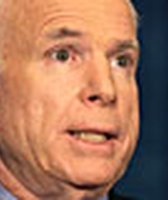Get PolitiFact in your inbox.
The distortions cometh
Taking a page out of recent Obama campaign ads, the McCain campaign released a TV ad on Aug. 15 called "Taxman" that cites items from three newspapers to bolster its argument that "Obama's new taxes could break your family budget."
Exhibit A: The announcer says: "The press warns the 'Taxman cometh.'"
On the screen is a footnoted citation, "Wall Street Journal 'Taxman Cometh' 7/01/08."
This comes from an editorial, not a news story. Here's a fuller context: "Ours is the only industrialized country that taxes its citizens even if they live overseas. That hasn't been a big problem as long as U.S. tax rates have been relatively low. But with Barack Obama promising to raise rates to French-like levels, this taxman-cometh policy could turn Americans into the world's foremost fiscal prisoners."
We think it's misleading to cite an editorial from one of the country's most conservative large paper editorial boards and present it as "the press."
Obama would increase the top income tax bracket from 35 percent to 39.6 percent. So there's no argument that for the wealthiest Americans the taxman cometh under Obama's plan. But there would be no change in tax rates for families with an adjusted gross income of less than $250,000. Translation: most Americans. Obama also would increase capital gains and dividend taxes rates from 15 percent to 20 percent for those who make over $250,000. Obama also proposes a $1,000 tax credit on income for working families ($500 for singles), to offset payroll taxes.
In its response to the ad, the Obama campaign cites a host of stories and editorials from major newspapers and political Web sites that conclude Obama's plan would result in a tax cut for most middle class Americans. There's even an opinion piece by Jason Furman and Austan Goolsbee in the Wall Street Journal that concludes, "Overall, Sen. Obama's middle-class tax cuts are larger than his partial rollbacks for families earning over $250,000, making the proposal as a whole a net tax cut and reducing revenues to less than 18.2% of GDP -- the level of taxes that prevailed under President Reagan."
Exhibit B in the McCain ad, "Obama's taxes mean 'higher prices at the pump' comes again from another editorial, this time from the Washington Post.
The editorial speaks to Obama's call for a windfall profits tax on oil companies.
"That cost would be passed along in forgone investment in new production, lower dividends for pension funds and other shareholders, and higher prices at the pump -- thus socking it to the consumers whom the plan is supposed to help," the editorial states.
Featured Fact-check
The Obama campaign says this fails to note Obama's call to use the windfall profits tax to support a $1,000 emergency energy rebate to help offset the high cost of gas at the pump as well as the expected rise in home heating costs this winter.
Lastly, Exhibit C: "Obama's taxes a 'recipe for economic disaster.'"'
This is another citation from a conservative editorial board, this one from the Las Vegas Review-Journal.
"He wants to raise the tax rate on the top income bracket from 35 percent to 39.6 percent, nearly double the tax rate on capital gains and dividends, and eliminate all tax breaks for the gas and oil industries and private equity firm managers. Talk about a recipe for economic disaster."
The announcer in the McCain ad concludes: "Higher taxes. Higher gas prices. Economic disaster."
We at PolitiFact have looked repeatedly at McCain's blanket claims that Obama's plan would translate to "higher taxes" and have found them misleading. As in this case, the ads never seem to note that the tax increases would only be on the wealthy.
But our primary gripe here is with an ad that deceptively tries to lend its message an air of credibility by claiming that it comes from an independent voice, "the press." This is becoming more commonplace, particular with the Obama campaign as we explore in this story. We examined an Obama ad that uses news citations and concluded that it was Half True.
With MCain, there is a kernel of truth to the claim, in that editorials are part of the press, but voters clearly understand the difference between news reports and articles of opinion.
Opinions make the political world go around, but the point is that there are many points of view about Obama's and McCain's tax plans and to present three editorials - two from historically conservative editorial boards - as the voice of "the press" is going too far.
For those reasons, we rate the ad Barely True.
Editor's note: This statement was rated Barely True when it was published. On July 27, 2011, we changed the name for the rating to Mostly False.
Our Sources
You Tube, "McCain Campaign 'Taxman' Ad" Aug. 15, 2008
You Tube, "Obama Campaign, Fact Check: Refuting More McCain Attacks" Aug. 15, 2008
Las Vegas Review-Journal, "Editorial: More class warfare; Obama sticks with the party playbook on tax policy" Sept. 20, 2007
Washington Post, "Tapping Tired Wells" Aug. 6, 2008
Wall Street Journal, "The Obama Tax Plan" by Jason Furman and Austan Goolsbee, Aug. 14, 2008
Browse the Truth-O-Meter
More by Robert Farley
The distortions cometh
Support independent fact-checking.
Become a member!
In a world of wild talk and fake news, help us stand up for the facts.


















































